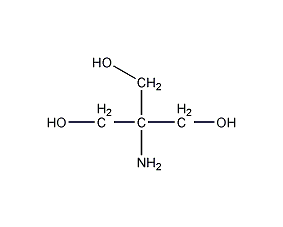Trihydroxymethylaminomethane 2-Amino-2-hydroxymethyl-1,3-propanediol


Structural formula
| Business number | 01MB |
|---|---|
| Molecular formula | C4H11NO3 |
| Molecular weight | 121.14 |
| label |
Tromethamine, ammonium bradylate, Trimethylaminomethane, trihydroxymethylaminomethane, Trishydroxymethylaminomethane, tromethamine, 2-amino-2-(carboxymethyl)-1,3-propanediol, Tricarboxymethylaminomethane, Tris(hydroxymethyl)aminomethane, 2-Hydroxymethyl-2-amino-1,3-propanediol, Aminomethylidine trimethanol, 2-Amino-2-methylol-1,3-propanediol,NH2C(CH2OH)3, Genetic engineering research reagents |
Numbering system
CAS number:77-86-1
MDL number:MFCD00004679
EINECS number:201-064-4
RTECS number:TY2900000
BRN number:741883
PubChem number:24899961
Physical property data
1. Appearance: white crystal or powder
2. Density (g/mL, 25/4℃): 0.865
3. Relative vapor density (g/mL, Air=1): Uncertain
4. Melting point (ºC): 171-172℃
5. Boiling point (ºC, normal pressure): 136-140℃/1.3kPa
6. Boiling point (ºC, 5.2kPa): Uncertain
7. Refractive index: 1.497
8. Flash point (ºC): 29
9. Specific rotation (º): Uncertain
10. Autoignition point or ignition temperature (ºC): Uncertain
11. Vapor pressure (kPa, 25ºC): Uncertain
12. Saturated vapor pressure (kPa, 60ºC): Uncertain
13. Heat of combustion (KJ/mol): Uncertain
14. Critical temperature (ºC): Uncertain
15. Critical pressure (KPa): Uncertain
16. Log value of oil-water (octanol/water) partition coefficient: Uncertain
17. Explosion upper limit (%, V/V): Uncertain
18. Explosion lower limit (%, V/V): Uncertain
19. Solubility: Soluble in ethanol and water, slightly soluble in ethyl acetate, benzene, insoluble in ether and carbon tetrachloride.
Toxicological data
1. Acute toxicity
Rat caliber LD50: 5900mg/kg; rat intravenous LD50: 1800mg/kg;
Mouse intravenous LC50: 1210mg/kg;
Rabbit caliber LD50: 1mg/kg;
Ecological data
None yet
Molecular structure data
1. Molar refractive index: 28.68
2. Molar volume (cm3/mol): 90.8
3. Isotonic specific volume (90.2K): 265.6
4. Surface tension (dyne/cm): 73.2
5. Polarizability (10-24cm3): 11.37
Compute chemical data
1. Reference value for hydrophobic parameter calculation (XlogP): -2.9
2. Number of hydrogen bond donors: 4
3. Number of hydrogen bond acceptors: 4
4. Number of rotatable chemical bonds: 3
5. Number of tautomers: none
6. Topological molecule polar surface area 86.7
7. Number of heavy atoms: 8
8. Surface charge: 0
9. Complexity: 54
10. Number of isotope atoms: 0
11. Determine the number of atomic stereocenters: 0
12. Uncertain number of atomic stereocenters: 0
13. Determine the number of chemical bond stereocenters: 0
14. Number of uncertain chemical bond stereocenters: 0
15. Number of covalent bond units: 1
Properties and stability
1. White crystal or powder. Melting point 171-172℃, boiling point 219-220℃/1.3kPa, soluble in ethanol and water, slightly soluble in ethyl acetate, benzene, insoluble in ether and carbon tetrachloride, corrosive to copper and aluminum, and irritating .
2. Flammable.
Storage method
This product should be sealed and stored in a cool, dry place.
Synthesis method
1. Prepared by reduction or catalytic hydrogenation of corresponding nitro compounds.
2.Nitromethane can be reacted with 3 mol of formaldehyde to generate trishydroxymethylnitromethane, which can then be reduced to trishydroxymethylaminomethane.
Purpose
1. The intermediate of fosfomycin can also be used as vulcanization accelerator, cosmetics (cream, lotion), mineral oil, paraffin emulsifier, and biological buffer.
2.Used as acid gas absorbent to prepare buffers, surfactants, emulsifiers and accelerators. Also used in organic synthesis.
